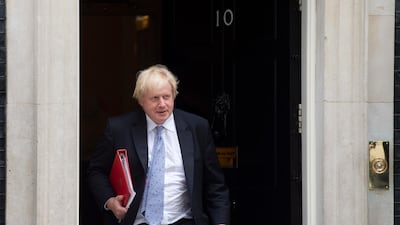It was the perfect, classic, transatlantic political melodrama.
The British prime minister was mid-air over a 3,000-mile stretch of ocean. The G7 summit at the other end offered a chance to appear stateswoman-like and purposeful.
Meanwhile, a scandal was breaking back home. The indiscreet and undiscriminating foreign secretary was caught on tape divulging state secrets, revealing international exchanges and smearing the nation's closest neighbours as enemies – not to mention smiting his most senior colleagues.
The weak prime minister could do nothing, either when she was up in the air or on the ground. Theresa May has merely reiterated her confidence in Boris Johnson and can only wait for the affair to blow over.
Much has been written in recent years about the comeback of the strongman leadership. An important coda is the weak man. Indeed, one is a functionary of the other.
Harold Wilson was a similarly crippled prime minister who oversaw Britain as it bumped from one disastrous episode to another. Things got so bad for him that when the foreign secretary repeatedly threatened to resign, Mr Wilson merely asked the aide to file the letter with all the others.
If there is any comfort for Mrs May, the troublemaking foreign secretary with the big personality at the time, George Brown, soon sank into a stupor of his own irrelevance.
A year ago Mrs May came out of a general election, having lost the majority that David Cameron bequeathed the Conservatives. She hobbles on with the support of a reactionary regional party.
The revolving door of power is spitting out more examples across Europe.
The new Italian prime minister sits between radical populists and the hard right in a cabinet of extremes.
Spain has just elected a socialist prime minister who commands the support of just a few dozen MPs.
Whether it is a result of democracy (as per the US and France) or something more skewed (Russia and Turkey), the only leaders able to make waves at the moment are those who act as strongmen with a wilful sense of destiny.
The G7 summit will put the tensions underlying these personality clashes on display.
After blasting his French and Canadian counterparts on Twitter late last week, Mr Trump announced he would be leaving the meeting four hours early.
Coincidentally, the last strongman to exit early was Vladimir Putin, who pulled out of the G20 in Australia after orchestrating the annexation of Crimea.
How fitting that Mr Trump will be travelling on to Singapore to meet Kim Jong-un. The US leader has been hungering for weeks for a meeting with the strongman he once taunted as "little rocket man”.
Belying his years, Mr Kim is is likely to give Mr Trump as good as he gets in the rhetoric stakes.
While the outcome of the Singapore meeting is unknown, a strong steer lies in Mr Trump’s declaration last week that he would like to host Mr Kim at the White House.
____________
Read more from Damien McElroy:
Qatar's pervasive but subtle influences hide in plain sight
George Soros: Brexit bogeyman or best for Britain?
The faked death of Arkady Babchenko was a spectacular own goal for Ukraine
____________
The post-colonial city state was whipped into shape by Lee Kwan Yew, who won election after election from the 1960s. He built a land of efficiency where no behavioural misdemeanours were allowed.
In return for high-rise housing, a gleaming metro, schools and hospitals, not even the chewing of gum escaped the city’s minders. A pliant population was rewarded with material advancement.
While that is not the contract that Mr Kim offers his prison camp of a country, it is a decent summing-up of the bargain Mr Trump and his peers effectively trade on.
Just across the border in Malaysia, there is now an example of the enduring appeal of this approach to leadership, Mahathir Mohamed, the archetypal political strongman in the 1980s and 1990s.
Asian values would, he said, lift the region from disadvantage, transforming places like Malaysia into world-beaters. Amid allegations of corruption in the establishment, Malaysians have now turned back to this ideology.
How envious must be weaker leaders who remain mired in the complications of policies, bogged down with the difficulties of constant negotiation.
The lesson they fail to learn is the strongman sets an ambitious goal and directly pursues it.
Leadership today is a simple act of making the agenda, not managing it.
Asked about his Englishness in light of his birthplace of Dublin, the first Duke of Wellington famously gave this answer: "Being born in a stable does not make you a horse".
A similar saying could apply to the accidental occupation of 10 Downing St.


